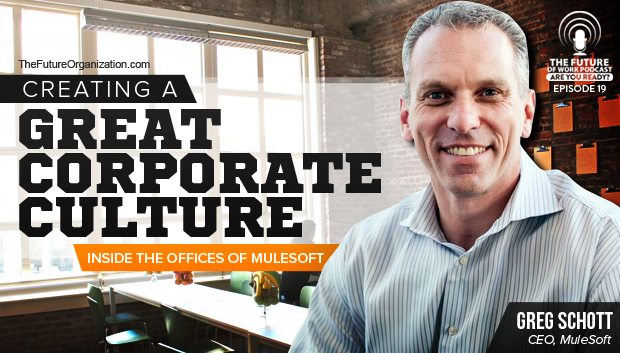Click Here to Subscribe via iTunes
Click Here to Subscribe via RSS Feed (non-iTunes feed)
What this episode is about and why you should care
MuleSoft is another organization that was recently ranked by Glassdoor as one of the best places to work in America and they have also won plenty of other awards for being a great place to work. According to Greg Schott, the CEO of MuleSoft, the key is creating a great corporate culture. I had the pleasure of visiting MuleSoft’s offices in San Francisco to speak with Greg in person. In this episode of the future of work podcast Greg shares some of the things he does at his company to help make sure his employees are engaged, happy, and always doing their best. Greg is one of the few CEO’s I know who personally interviews every new candidate that applies for a job. This means many hundreds of interviews a year. Listen in to learn what else Greg does to create a great corporate culture.
What you will learn in this episode
- Greg Schott’s management style and his role as CEO of MuleSoft
- Why is MuleSoft unique
- Why Schott interviews every candidate
- How does physical office environment play in the corporate culture
- Management and leadership at MuleSoft
- Compensation vs. perks and benefits
- Virtual vs. physical work environments
- The role of technology in creating a corporate culture
- Talent management: growth and career development
- Top 3 most important factors for creating a desirable corporate culture
- The importance of transparency
Links from the episode
 Send to Kindle
Send to KindleThe post Corporate Culture: MuleSoft appeared first on .




![[Research Round-Up] New Study Shows the Continuing Value of B2B Thought Leadership](https://customerthink.com/wp-content/uploads/development-2010010_1280-pixabay-innovation-ideas-think-1-218x150.jpg)